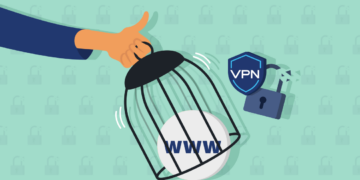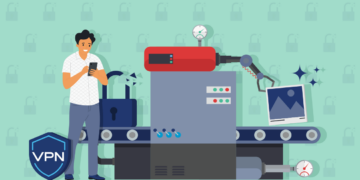
In light of the 2024 elections in the United States, online disinformation and the rise in censorship of political content on social media platforms are reason for concern.
While censorship in the United States may not be extremely overt, it’s certainly on the rise. Moreover, mass surveillance and relentless collection of user data puts Americans’ privacy at risk.
If you want to protect yourself against tracking and make sure your access to information remains unrestricted, we recommend using a VPN. A VPN will encrypt your online activity and prevent agencies from infringing upon your privacy.
NordVPN is our #1 VPN for the United States. It has highly-advanced security features and doesn’t collect any user data.
NordVPN
Have a look at how censorship in the United States is on the rise by reading our full article below.
As the United States prepares for tense elections this year, many Americans are turning to social media to stay informed. However, with misinformation on the rise, big tech companies walk a dangerous line between fighting fake news and exercising censorship.
Moreover, larger debates on school curricula, public libraries, and access to information are sparking widespread concerns about restrictions on freedom of expression in the “land of the free.”
Mass surveillance and bulk collection of user data also put citizens’ privacy at serious risk and have increased self-censorship.
Want to keep your data private and have access to an open internet? Use a VPN! A VPN will keep your data encrypted and protect you against tracking and surveillance.
Though not as overt as in countries like China or India, censorship in the United States is very present and currently on the rise.
Censorship in America: How Bad is it?

In recent years, internet freedoms in the United States have decreased to the extent that Reporters Without Borders had previously marked the US as an enemy of the internet.
While media plurality is present, recent years have seen a huge spike in limitations on access to information, primarily in schools and libraries. On top of that, the First Amendment, which protects freedom of speech, has come more under pressure in the age of digital media.
With elections right around the corner, there are also growing concerns about AI-generated propaganda and disinformation. Let’s delve right in!
Book banning: restricted access to information
One of the most prominent examples of modern censorship in the United States is the attempts to ban books in schools and libraries. The American Library Association has reported record-breaking bans over the last two years.
Most of the books that are being pulled off the shelves address LGBTQ+ issues and/or are written by people of color. Critical race theory and sex education are both heavily contested subjects in the United States, with attacks on public school curricula becoming more prevalent.
Book banning is a key characteristic of censorship. It’s a tactic to limit (young) people’s access to information about race, gender identity, and sexuality.
Information that also gets stripped often discusses the realities of police brutality, discrimination, and the long history of marginalized groups in the US. By denying access, students — those who need it the most — are denied exposure to a plurality of ideas.
Why is banning books legal?
In the United States, the Supreme Court gave local school boards “broad discretion in the management of school affairs” in 1982. This has created inherent tension between access to information and education on the basis of “community values.”
Book banning in the US is part of a larger cultural war about education. In Republican-led states, the religious-political influence is strong. This, in turn, has sparked protests from students, non-profit organizations, and teachers alike.
“By depriving a rising generation of the freedom to read, these bans are eating away at the foundations of our democracy.”
Suzanne Nossel, CEO of Pen America
Over 40 percent of book bans have occurred in the state of Florida, which is also a front-runner in other areas of American censorship.
2024 elections: AI-generated propaganda
With the elections underway, social media companies face a difficult challenge: how to stop the spread of misinformation without resorting to censorship?
After evidence of Russian interference in the 2016 elections came to light, disinformation has become a major topic of concern. This intensified during the COVID-19 pandemic when conspiracy theories increased, and Meta struggled with its content regulation.
Now, generative AI tools have made it even easier to mislead voters and shape election outcomes through a type of technology known as “deepfakes.”
For the 2024 elections, cyber experts expect a wave of online disinformation, which will result in the indirect censorship of accurate information.
Big tech: content removal
Social media companies such as Meta and X face a difficult dilemma: content moderation, especially in America, is often viewed as an infringement upon freedom of speech.
On the one hand, there’s a responsibility for big tech to limit harmful, illegal, or false information online. At the same time, intervening in user-generated content can easily lead to censorship. After all, who decides what content is harmful or false?
Meta limits “political content”
Most recently, Meta has made changes to its treatment of “political content” on Instagram and Threads, removing it from users’ For You pages or demonetizing it. This is happening just months before the presidential election.
While it’s possible to opt out of the setting, Meta has been actively reducing political content on its platforms since 2021. This limits the free flow of information and sets a precedent for more severe censorship.
On top of that, Human Rights Watch has reported that Meta’s content moderation has “increasingly silenced” pro-Palestinian voices. Censorship, here, takes the form of so-called shadowbanning, which occurs when content creators are deliberately demoted on a platform.
Freedom of speech vs. censorship
Notably, both the political Left and political Right are concerned about content moderation and censorship on social media platforms.
Florida Gov. Ron DeSantis is calling for legislation that bans social media companies from “censoring” political posts, crying modern McCarthyism and sparking widespread debate about the reach of the First Amendment.
Progressives, on the other hand, will point out that the First Amendment was not designed to protect all speech from regulation or consequence. Online hate, harassment, and incitement to violence may still be silenced, even on the basis of the First Amendment.
As such, content regulation is in muddy legal territory.
Why Does the United States Censor the Internet?
In comparison to other nations, the United States does not heavily censor the internet. The First Amendment protects the online space against government censorship and internet service providers (ISPs) are not forced to block online content.
Even so, censorship does occur, mainly through big tech content removals. On top of that, states have the freedom to structure their own legislation for (online) censorship to some extent.
Overall, censorship is often motivated by the desire to protect certain social norms and morals or out of security concerns.
Self-censorship
While self-censorship among journalists and internet users in the United States seems relatively limited, Freedom House reports that women and marginalized communities are often subject to online abuse.
This can encourage online self-censorship, especially when it comes to socially and culturally contested topics.
On top of that, the rise of mass surveillance by US government authorities has caused people to be less free in what they express online. If you wish to prevent the government from tracking your every online move, we recommend using a VPN.
What Content is Being Censored?

As a general rule, the United States government does not block or filter access to content on the internet. When it comes to censoring user-generated content, the US government has limited power.
However, there are categories of content that are censored online.
CIPA: content unsuited for children
The Children’s Internet Protection Act (CIPA) requires schools and public libraries in the US to install filtering software that prevents minors from accessing content that is obscene or harmful. It is a condition for receiving funding through the E-rate program.
CIPA is in line with two other acts created to protect kids online: the Communications Decency Act and the Child Online Protection Act, which have its own issues.
While CIPA is meant to protect children they same way parental controls are meant to keep children safe online, the Electronic Frontier Foundation has warned that aggressive interpretations of CIPA have led to unnecessary censorship.
Websites that may provide children with valuable (age-appropriate) information about sexual education, discrimination, or other issues, are made inaccessible.
Apps and websites
Some websites and apps are subject to censorship in the United States. WikiLeaks has been suspended at several points, once in 2008 after a court order and again in 2010 when it was removed from its host servers (Amazon).
Notably, the Department of Defense has banned certain IP addresses from its computers.
There have also been reported instances of eNom, a private domain name registrar, disabling domain names on a blocklist created by the Office of Foreign Assets Control. This included some websites that were not even hosted in the US or targeted at Americans.
In 2018, TikTok was banned for “potential security risks.” Now, in 34 out of the 50 states, the app is banned on the devices of government officials. Users who want to access TikTok will have to use a VPN.
DMCA take-downs and illegal content
If illegal content, such as images of child abuse, is posted online, a court order is required to remove them.
Media that infringes on US copyright protections can be removed under the “notice-and-take-down” mechanisms of the Digital Millennium Copyright Act (DMCA).
Under the DMCA, hosting sites are shielded from legal liability if they act to remove the offending content when they receive the DMCA notice.
How Does the United States Censor the Internet?

There are several laws and regulations that give shape to US censorship. These include parameters for protected speech and legislation designed to curtail illegal sexual conduct online. However, some regulation unintentionally limits free speech rights.
On top of that, mass surveillance plays a large part in the rise of self-censorship.
Legislation and regulation
There are several federal laws in the United States that aim to protect cyberspace but can cause unintended censorship. A previous example is CIPA, which we already discussed.
A set of legislative acts around sex trafficking has also been called “disguised internet censorship” by pro-internet groups. It pertains to the Stop Advertising Victims of Exploitation Act from 2015 and two related bills from 2017 and 2018 (FOSTA-SESTA).
These laws make it illegal to advertise content related to sex trafficking. They caused concerns about the over-censorship of content by platforms that host user-generated content in order to avoid “knowledge” of illegal activity. Online sex workers have argued that the bill harms their safety.
State legislation also allows for certain types of censorship, which sometimes clashes with federal legislation. In 2023, the state of Montana tried to implement a full ban on TikTok, which was ruled unconstitutional.
Surveillance
Over the last decade, surveillance of internet user activities, as well as the retention and transmission of user data, has soared in the United States. Post 9/11, the mandate for government surveillance has been expanded greatly.
Under the authority of the Foreign Intelligence Surveillance Court, security and intelligence services such as the NSA and the FBI have the power to collect Americans’ personal data, from phone logs to online activity.
Data retention is mainly done in bulk, with private information stored for up to five years. These types of practices greatly undermine users’ right to privacy.
As such, cybersecurity experts recommend keeping your private data encrypted by using a VPN, which also limits government tracking.
How to Get Around Censorship in the US

If you want to maintain access to an open internet or you’re worried about state surveillance, the best online tool to use is a VPN (virtual private network).
A VPN creates an encrypted tunnel between your device and the internet, keeping all your online activity private and away from prying eyes. This includes your internet service provider, government agencies, and any other parties.
More importantly, a VPN lets you get an IP address from anywhere in the world, meaning you can access independent news sites or apps that are otherwise unavailable.
Are VPNs legal in the United States?
Using a VPN to ensure online anonymity is entirely legal in the United States and an effective way to circumvent growing surveillance.
Since the United States is part of the 5, 9 and 14 Eyes Alliances, however, we do recommend that you use a VPN from a provider that doesn’t store any user data. That way, you won’t have to worry about data collection through court order.
Below, we list the best VPNs for the United States.
Best VPN for the United States
We’ve tested 35+ different VPNs to see which ones are the best VPNs for the USA. The #1 best VPN for America that you can get at the moment is NordVPN.
However, depending on your personal preferences, you might want to consider some other options.
1. NordVPN: Best VPN for the US overall

Features:
- Double VPN encrypts your VPN connection twice for extra security
- Threat Protection keeps malware at bay
- With a strict no-logs policy no data gets collected
- 1,970+ VPN servers in the United States alone
NordVPN is the ultimate VPN for the United States, thanks to its advanced encryption, high-speed servers and vast server network. With 6441 servers across 111 countries, you can bypass censorship easily.
Moreover, NordVPN protects you against surveillance and keeps your data private, thanks to its zero-logs policy. Since its headquarters are located in Panama, you don’t have to worry about your data ending up with US agencies.
If you want to enjoy streaming services around the world, then NordVPN might also be the right choice for you. You can access any international version of Netflix you like. Right now, you can get 72% off your NordVPN plan!
Want to know more? Read all about NordVPN in our comprehensive NordVPN review. You can also try the service out for 30 days first!
2. Surfshark: Cheap VPN for unlimited devices

Features:
- Rotating IP feature to prevent tracking
- Very affordable subscription plans
- Get unlimited simultaneous connections and use Surfshark on any device
- 25 server locations in the United States and over 600 US servers
You might be tempted to sign up for a free VPN instead of paying for one. However, if you’re looking for a super affordable VPN that doesn’t come with restrictions, we recommend Surfshark!
This highly secure VPN has a full RAM-only server network: no one will be able to access your data because it gets only stored temporarily. Pair that with solid malware protection, high speeds, and a server network of 3200+ servers worldwide, and you’re all set.
More importantly perhaps, Surfshark is one of the most user-friendly VPNs out there and lets you install the VPN on unlimited devices, making it perfect for sharing an account.
We tested Surfshark extensively and highly recommend it! If you want to see for yourself, you can always use the 30-day money-back guarantee.
3. CyberGhost: Beginner VPN with dedicated servers

Features:
- 11700+ servers in 100 countries
- 45-day trial period: get a full refund if you want
- Optimized servers for gaming, streaming, and torrenting
- Advanced security features and a zero-logs policy
One of the major benefits of picking CyberGhost as your VPN provider is that their easy-to-use software can be installed on up to 7 devices, allowing you to surf anonymously on whichever device you are using.
In CyberGhost, you get a very privacy-focused VPN that has over 1,280 VPN servers in the United States. You also get access to dedicated gaming, streaming, and torrenting servers.
Moreover, the CyberGhost software is compatible with all devices and operating systems, including Windows, Mac, iOS, Android, and Linux. Thanks to the 45–day money–back guarantee, you can claim your subscription costs back if you aren’t happy, with no questions asked.
Read more about this VPN provider in our full CyberGhost review.
Final Thoughts: Get Around Censorship in the US
While censorship in the United States is not as explicit as in other nations, suppression of ideas in the public sphere is becoming more and more common.
Red states are banning books on critical race theory and LGBTQ+ rights in schools and libraries, while social media companies struggle with managing free speech and the spread of misinformation online.
On top of that, mass surveillance is pushing internet users to self-censor out of fear of being tracked online. With the 2024 elections just around the corner access to an open internet and a free flow of information is more important than ever.
Make sure you keep your online activity private and unlimited with a VPN!
For more information on censorship and using a VPN, have a look at these related articles:
- Bypass Online Censorship: How to Freely Access the Internet
- Censorship in Russia: How to Get Around Online Restrictions
- Best VPN Outside 14 Eyes Countries
If you have any questions about US censorship, you might find your answer below. This is a list of the most frequently asked questions about US censorship, and our answer to them.
Censorship is on the rise across the United States. In particular, states are attacking schools and public libraries by requesting books on topics of sexuality, race, and gender be banned.
On top of that, AI-generated content flourishes online, as does disinformation about the upcoming 2024 elections. Social media companies are having a hard time with content removal turning into a slippery-slope on the censorship front.
Unlike censorship efforts in China or other nations, the United States does not outright censor the internet. However, certain websites and applications are restricted under particular conditions, including TikTok.
On top of that, several pieces of legislation lead to unintended censorship.
Want to avoid widespread surveillance by the US government? A VPN (virtual private network) can come in handy.
A VPN will hide your IP and make you anonymous when browsing the web. Have a look at our selection of the best VPNs for the US!




